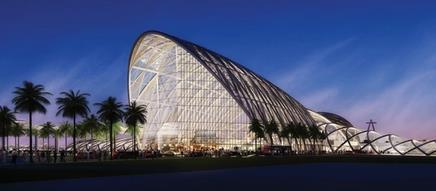Two RCA postgraduate architects gives their verdict on HOK’s design for a Californian transport hub
About the scheme: This is architect HOK’s winning design for a transport hub for Anaheim in California.
The scheme connects rail, bus and taxi services, and future phases will include high-speed rail links.
The building will have solar panels, lightweight insulation systems and a solar water heater. It will start on site in 2010 and be completed by mid-2013.
Thomas Greenall’s verdict: With the opening of Dubai’s new high speed metro at 09:09:09 on 09/09/09, the slightly more sceptical amongst us might be forgiven for believing that there is some kind of worldwide conspiracy to unify the design of all transport architecture.
After all, when it comes to ‘world-class’ station design, the glass and steel parabolic grid-shell is hardly something new.
Yet, despite this comparison to a form of architecture that might currently appear ubiquitous, HOK’s design seems to resonate with an all-together more nostalgic idea of public travel: In America, getting from one city to another by train remains a thoroughly romanticised exercise — a humane relic of a more cosmopolitan and energy-efficient era in transportation.
The design for the $180m train station and transit hub, known officially as the Anaheim Regional Transportation Intermodal Centre (ARTIC) beat an impressive list of high-powered competitors, including architect-engineer partnerships headlined by Frank Gehry, Cesar Pelli, Norman Foster and Santiago Calatrava.
It did so with a design that shares more than a few qualities with the hugely popular retro baseball stadiums produced by the firm’s sports-architecture wing, once called HOK Sport and now, as an independent entity, known as Populous (responsible for London’s 2012 centrepiece).
However, as a visual symbol, ARTIC will operate quite differently. It will appeal to a charming, essentially 19th century notion of the train station as a place of metropolitan arrival: “A grand portal designed to deliver passengers directly into the middle of a crowded, bustling city, lending some sense of glamour to a train trip simply by a kind of architectural osmosis,” according to the American press.
Of course, in Orange County, the idea of stepping from a train right into the middle of dense urban life — the way you might exit London’s Paddington, or say Shinjuku Station in Tokyo — is an obvious fiction. And it will remain a fiction for many decades, if not indefinitely. Many more people will likely see the station’s arched profile from their cars on the freeway than as they walk to or from a train.
But whatever the shortcomings of its striking, but somewhat derivative architectural approach, HOK’s design is must be recognised for its green credentials – a testament to the city’s visionary environmental ambition, say the architects.
It will appeal to a charming, essentially 19th century notion of the train station as a place of metropolitan..
Awarded the highest environmental rating by the US Green Building Council, the building will incorporate solar panels, ETFE cushions and a solar water heater built into the roof to reduce energy use, water use, solid waste production and carbon emissions.
It is, however, yet to be seen whether or not this will be enough to convince the teenagers of Orange County to leave their SUVs at home.
Ian Douglas-Jones’ verdict: Thankfully ARTIC is slightly easier to say than Anahiemregionaltransportationintermodalcenter. And so it seems that H.O.K’s solution will make easier the connection of Anaheim’s disparate transport systems.
LA is notoriously difficult to navigate without personal transport, this building is aimed to alleviate some of the cities transport ills, well Anaheim’s at least. Its future view to act as high speed train nexus for the western seaboard conurbations, reaching, San Diego, Sacramento, San Francisco and Vegas.
With that in mind the building itself has a lot to live up to: Kicking off in true style, ARTIC puffs its chest with a swooping, soaring iconic 180-foot archway roof, a scream for attention masquerading as a ‘distinctive gateway’.
With The Angel Anaheim stadium (and ahem; Disney Land) just a stone’s throw away there’s no shortage of good taste inspiration!
An elongated crisc-cross patterned sausage bisects the bulbous wings of the main ‘gateways’. The result is a quite light if not delicate structure, which envelops the main building’s 6,100m².
Exalting the green credentials HOK is aiming for an LEED Platinum award from the US Green Building Council.
The main structure being clad with light weight ETFE cushions, solar water heaters and solar panels. California’s green Governator will no doubt be pleased.
Acting locally as link to aforementioned attractions as well as the Anaheim Convention Center and Honda Event Center, ARTIC will be cashing in on the footfall with predictably many retail, restaurants and passenger services.
Postscript
Architect Ian Douglas-Jones has just graduated from the Royal College of Art. Read about his final degree show at Towards New Capital.
For the latest jobs in architecture worldwide visit Building's specialist job site.




























No comments yet